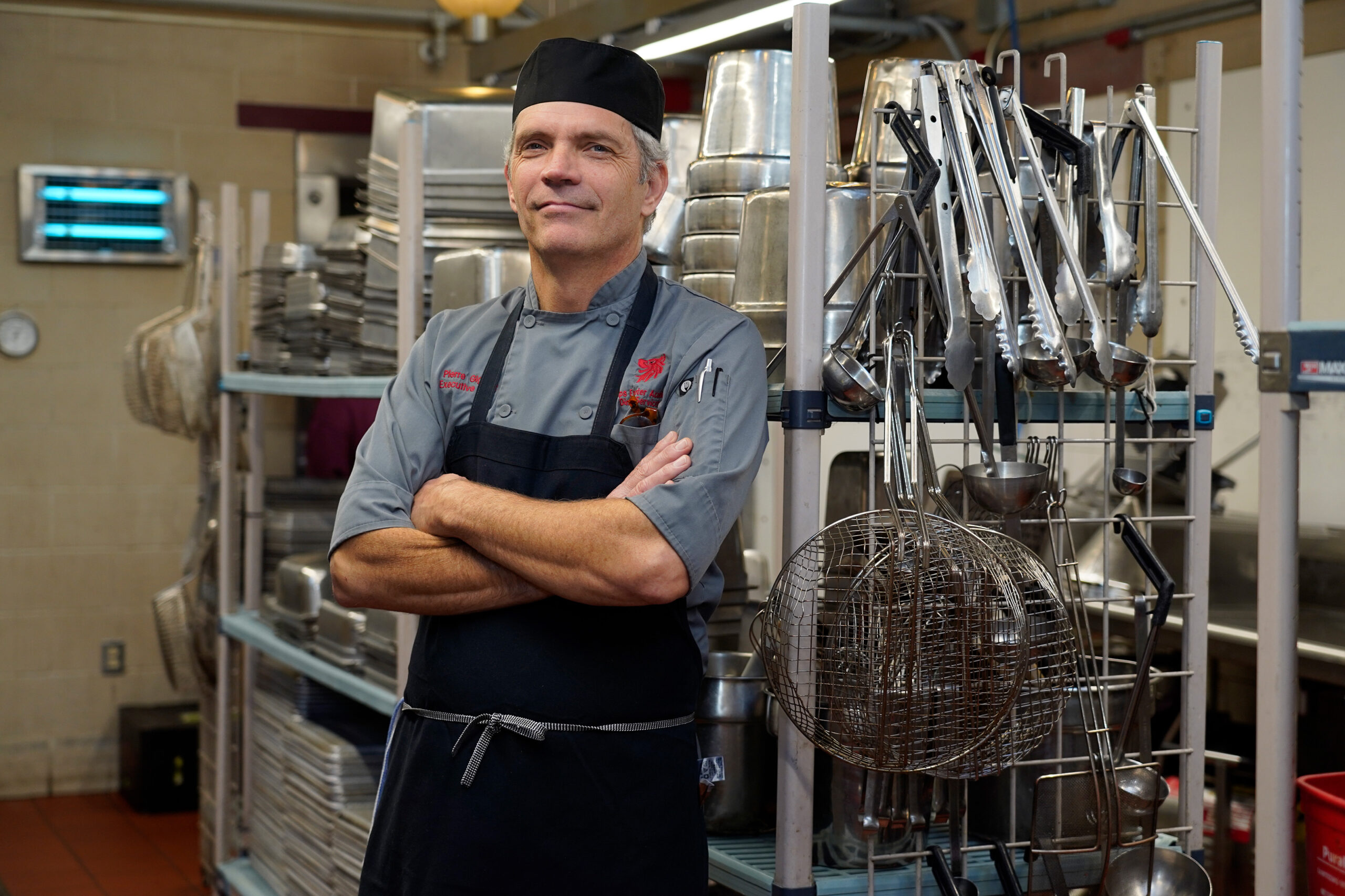Pierre Gignac: Dining by design

Elm Street dining hall is quiet on an early fall morning as students filter in for lunch. Executive Chef Pierre Gignac gives a visitor a tour of the high-ceilinged space, stopping along the way to greet members of the kitchen and dining staff. It’s a little past 11 a.m. but Gignac is already well into his day, which started around 7 o’clock. As he observes the dining hall fill and echo with student voices, he says, “This is the social center of campus, especially for preps. It’s where they gather at the beginning of the year.”
If Elm Street is a welcoming space for students to enjoy a meal, then Gignac and the dining services team are doing their jobs well. Overseeing daily preparation of 2,100 meals in two dining facilities, developing hundreds of recipes to meet the diverse tastes and dietary needs of students, faculty and staff, and creating menus for catered special events may seem like herculean tasks, but Gignac takes it in stride. His days usually start with checking in on operations, touching base with the management team and prioritizing the day that often includes meetings with production staff, dining leadership and purchasing manager to review purchasing needs. A former restaurant owner and chef, Gignac is accustomed to organized chaos. “There are many factors that drive a successful meal,” he says. “You must adapt to conditions to prepare and transport food and deal with clientele. It’s like catering at its finest.”
A native of Montreal, Gignac has worked in the restaurant and catering industry for 40 years. He started cooking at 15, then attended culinary school at the Institut de tourisme et d’hôtellerie du Québec. For 17 years, he ran 98 Provence, a restaurant in Ogunquit, Maine, with his wife, sister and brother-in-law. Prior to joining Exeter, he was executive chef at Ocean at the Cape Arundel Inn, a fine dining restaurant in Kennebunkport, Maine. A desire to work a more regular schedule drew him to Exeter, where he finds preparing meals for a school population not unlike running a restaurant. “It’s dining on a bigger scale,” he says. “You have to think out of the box a lot of the time, but I like that we can do different styles of cooking.”
With hundreds of recipes in rotation at any given time, Gignac’s menus address varied appetites and dietary requirements, from healthy carbs and proteins to low-fat, vegetarian, vegan, plant-based, gluten-free and halal options. Meal selections change every four weeks. Electronic monitors in both dining halls detail each dish served as well as its allergen content. Gignac meets kitchen and serving staff before each meal to review what’s being served and what allergens are contained in each dish (he also consults regularly with Exeter nutritionist and dietician Tina Fallon). There’s always a large salad bar at lunch and dinner as well as a protein like grilled chicken or salmon on the menu. Vegan and vegetarian options like tofu fajitas and Impossible Burgers may be featured alongside popular comfort foods like macaroni and cheese, hamburgers, hot dogs and chicken tenders. “We have a lot more choices now than we did several years ago,” Gignac says. “A good portion of our food — 75% — is fresh.”
Sustainability is important, too. When possible, Gignac works with food suppliers that provide sustainable options. One example is North Coast Seafoods, a company that produces a 100% vegan, allergen-free kelp burger. “It’s a wonderful, more natural product that’s not overprocessed,” he says. “People aren’t moving away from options like tofu, but this helps us provide another healthy choice.”
One of the best aspects of Gignac’s job is being able to develop and cook a variety of dishes. One of his favorites is a yellow tomato gazpacho that he developed while at Ocean (it was also a favorite of former First Lady Barbara Bush). Other personal favorites like Korean short ribs and leg of lamb have been embraced by students. Gignac’s also incorporated recipes from Exeter parents, including a vegan bibimbap made with Impossible ground beef and palak paneer, a vegetarian spinach and cheese dish from northern India.
How do you make school food, traditionally served in large quantities, delicious? “It’s about elevating your program,” says Gignac. “Purchasing quality food, choosing the right menus, training and hiring the right staff.” One advantage: the dining services staff includes former restaurant chefs who trained under Gignac. “Our biggest challenge is volume cooking,” he says. “But the cooks have an affinity for seasoning and adding dimension to a dish and understand color and presentation. Plus, they care about how the food tastes. We’re always correcting recipes and figuring out how to improve on them.”
After two years of grab-n-go, food trucks, and outdoor or socially distanced dining due to the COVID-19 pandemic, this school year is shaping up to be more “normal,” says Gignac. More change is in store: at the end of the 2022-23 school year, Wetherell is slated for renovation and will be closed. Dining staff are considering different locations on campus to create temporary dining space; a modular kitchen and outdoor freezer will help with meal preparation. Gignac is consulting with the project’s architects about kitchen design and choosing new kitchen equipment, emphasizing more energy-friendly electric options.
With so much going on, every day is different, which Gignac enjoys. “When I arrive in the morning I have an agenda, but 90% of the time my day veers off in a different direction,” he says. “But that’s the nature of the job. It’s still fun.”
— Debbie Kane